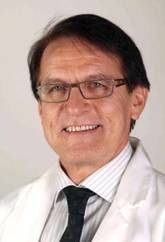 LONDON – More than two-thirds of patients with medically refractory chronic cluster headache responded to on-demand, self-administered sphenopalatine ganglion stimulation with acute pain relief, less frequent attacks, or both.
LONDON – More than two-thirds of patients with medically refractory chronic cluster headache responded to on-demand, self-administered sphenopalatine ganglion stimulation with acute pain relief, less frequent attacks, or both.
The prophylactic effect – a reduction in cluster attack frequency, but in most cases without acute pain relief – came as a surprise to investigators in the prospective, controlled, multinational Pathway CH-1 study, Dr. Jean Schoenen admitted at the European Headache and Migraine Trust International Congress.
“This was the largest, most rigorous study to date of an implantable medical device for headache treatment. The study was not designed to look at attack frequency; it was designed to look at acute response. Yet, we have this preventive effect that I think now has to be confirmed in another well-designed trial,” said Dr. Schoenen, coordinator of the headache research unit at the University of Liege (Belgium).
For more than 100 years, the sphenopalatine ganglion (SPG) has been thought to be a key mediator of the cranial autonomic symptoms and unilateral periorbital pain that define cluster headaches. In the Pathway CH-1 study, Dr. Schoenen and coinvestigators evaluated the efficacy and safety of a miniature electrical neurostimulator implanted in the pterygopalatine fossa near the SPG. The neurostimulator is activated by a hand-held remote controller the patients hold up to their face for on-demand therapy.
A neurosurgeon implants the SPG neurostimulator via a minimally invasive procedure using a transoral, gingival buccal technique that leaves no externally visible scars.
Dr. Schoenen reported on 28 chronic cluster headache patients who were dissatisfied with their current treatment and opted to participate in the trial. They underwent neurostimulator implantation, followed by a minimum 3-week postsurgical stabilization period during which the device remained switched off. During the subsequent controlled experimental phase, they each self-treated a minimum of 30 attacks over a 3- to 8-week period. Once the device was fired up, it couldn’t be employed again for 90 minutes. The remote controller was programmed to randomly deliver full stimulation, subthreshold stimulation, or sham treatment.
Overall, 7of the 28 patients, or 25%, were categorized as acute responders, meaning that full stimulation achieved marked pain relief within 15 minutes with no acute medication in more than half of treated attacks. Another 10 patients (36%) were “frequency responders” who experienced at least a 50% reduction in cluster attack frequency, compared with baseline with no change in preventive medications and with nonacute pain relief. Two patients (7%) were both acute and frequency responders. A total of 32% were nonresponders.
Frequency responders didn’t start experiencing fewer cluster attacks until after the weeks of postsurgical stabilization ended and neurostimulation began. This makes it highly unlikely that the prophylactic effect was somehow due to the surgery itself, according to the neurologist.
Significant pain relief was documented 15 minutes after full stimulation in 67% of treated attacks, half of which involved pain freedom. In contrast, significant pain relief occurred in only 7% of attacks that were addressed with subthreshold stimulation or sham treatment.
Sixty-four percent of subjects showed clinically meaningful and statistically significant reductions in headache disability as indicated by improved scores on the Headache Impact Test-6. Quality of life improved in 75%, as reflected by their scores on the Short Form-36 physical and/or mental component summary scores, Dr. Schoenen continued.
Acute medications were used within 90 minutes of 31% of cluster attacks treated with full stimulation, compared with 78% of those addressed using subthreshold stimulation and 77% that got sham therapy.
Far and away, the most common adverse event involved mild-to-moderate sensory disturbances in the maxillary division of the trigeminal nerve, experienced by 81% of subjects. These symptoms resolved within 3 months. Two patients experienced infections. Two others required device explantation due to lead migration.
The ongoing Pathway CH-1 study will continue on an open-label basis for 1 year post-implantation.
The device, known as the ATI Neurostimulation System, is MRI compatible. It has been approved for marketing by the European regulatory authorities. The manufacturer, Autonomic Technologies of Redwood City, Calif., will also seek Food and Drug Administration approval.
In addition, the company has launched the multicenter, controlled European Pathway M-1 trial in which SPG neurostimulation is being evaluated for the treatment of disabling migraine.
Dr. Rigmor H. Jensen, president of the European Headache Federation, commented that an invasive device such as this will likely be reserved for those few cluster headache patients who are completely refractory to all medications. That’s probably 1%-3% of the cluster headache population, estimated Dr. Jensen, research professor of neurology at the University of Copenhagen.
Dr. Schoenen is a consultant to Autonomic Technologies, which is funding the Pathway CH-1 study.
By: BRUCE JANCIN, Clinical Neurology News Digital Network